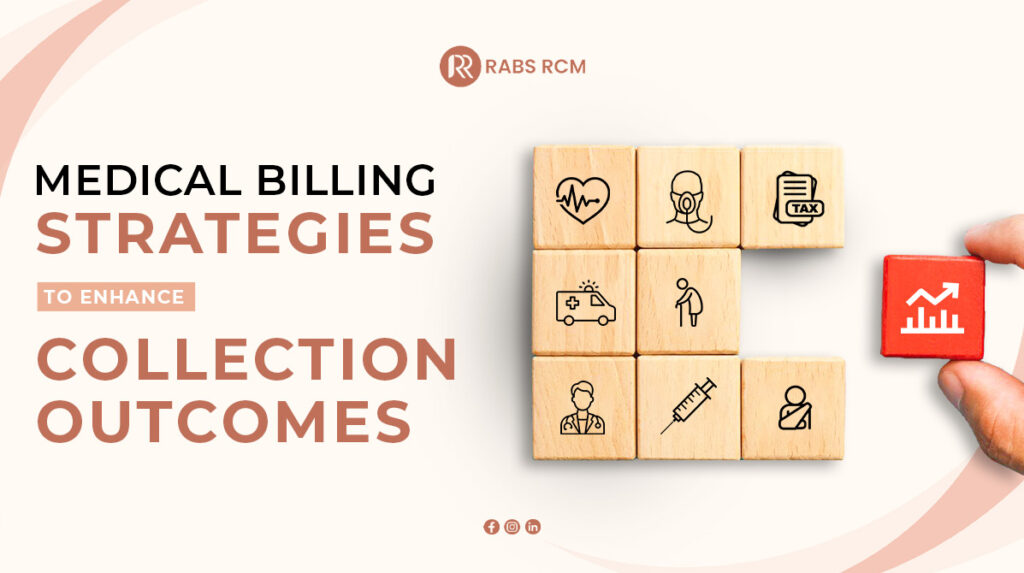
Medical Billing Strategies To Enhance Collection Outcomes
One of the most essential parts of the healthcare industry is collection in medical billing. Every day, providers encounter challenges in obtaining money from insurance companies and patients due to increased demand for documentation and patients opting for co-payment. Before moving forward with the technicalities, let’s get the big question out of the way.
What really is Medical Billing Collection?
The term collection in medical billing refers to maintaining a clear financial plan and engaging effectively with patients. The medical specialist collects patient data (demographics) and information about the service provider to prepare invoices and send them to payers for reimbursement, clearly identifying each phase in the medical billing/collection process.
The following are some strategies to increase collection outcomes:
Establish a Transparent Collection Process
Keeping transparency in the collection process is crucial for fostering trust and efficiency in the healthcare financial ecosystem. Transparency allows all the stakeholders, including healthcare professionals, insurance companies, and patients, to develop a clear and better understanding of each process, such as billing procedures and financial obligations. It entails conveying billing procedures, charges, and payment expectations to patients straightforwardly and concisely. Transparency in the collecting process also helps to expedite communication between healthcare providers and insurance corporations, decreasing disputes and reimbursement delays. An understandable and transparent collection process brings clarity and ensures patient trust by mitigating confusion and encouraging a sense of trust in the healthcare system.
Error-Free Claims Submission
Error-free claims submission holds significance in enhancing outcomes in medical billing. To ensure error-free claims, familiarize yourself with the corrective process specific to your region and ensure accurate documentation. Regularly review and update codes to ensure proper coding and billing. Double-check claims for errors and implement a proofreading process to catch potential mistakes. Monitor and analyze rejected claims to identify patterns or common issues. Use practice management software to provide detailed reports on rejections and denials. Addressing recurring problems by implementing further education, training, or additional checks and balances in coding and billing processes will help prevent claim rejections and ensure timely payments.
Denial Management
Denial Management is a strategic process that aims to identify and resolve problems contributing to medical claim denials. However, the approach can reduce the likelihood of future denials, ensuring that practices get paid sooner and have a stable cash flow. To reduce denials, you need an effective team. A team that is in charge of identifying a pattern between recurrent denial reason codes and denial reason codes. Their aim should be to identify and resolve registration, billing, and medical coding flaws through trend tracking to avoid future denials. The team also examines payment trends for individual payers, making it simple to spot deviations from the norm.
The team can accomplish that feat by carrying out the following actions:
- Routing Denials Directly
- Sorting the Work
- Creating Standardized Workflow
- Using a Checklist
Identify Account Receivables
Account receivables refers to the money a patient or an insurance company owes to medical practice. It can include payments for services rendered and reimbursement for services already paid out of pocket. The best method to handle accounts receivables with evident concerns such as late or denied payments and frequent contact information changes is to focus on them by sending more reminders, and if they persist, transferring them over to the house is the best alternative.
Stay Up-to-Date
Staying current in medical billing processes is imperative for healthcare professionals in the evolving healthcare landscape. Due to constant changes in regulations, coding practices, and payer requirements, staying current on these updates ensures accuracy in billing processes. Training and educating staff on edge-cutting medical billing techniques, terminologies, updates, and technology can help to streamline the medical billing processes in the long run and enhance overall collection outcomes.
Conclusion:
Effective medical billing strategies are crucial for successful healthcare collection outcomes. Enhancing the collection outcomes in medical billing has heightened the demand for highly skilled medical billers. These strategies form an integral part of the process for those seeking to elevate their collection outcomes. By consistently applying these refined strategies, one can optimize financial processes and enhance overall efficiency and collection outcomes, thereby establishing a robust and dependable healthcare system.

Precision. Performance. Partnership.
Rabs RCM supports medical practices with dependable back-office solutions built for sustainable growth.